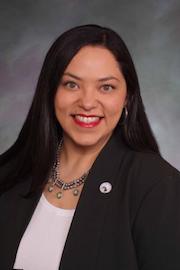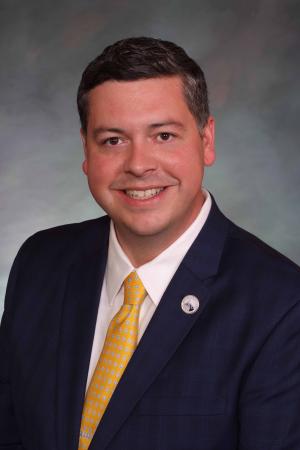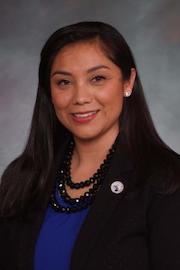
Northwest Denver’s three state legislators, recently elected to new leadership positions, said they will seek to help Colorado residents secure housing and COVID-19 assistance during this year’s General Assembly session.
Creating policies to add more affordable housing and trying to get more vaccinations for underserved regions by lobbying state health officials will headline their agendas when the full Legislature is expected to continue its 120-day session on Feb. 16.
State Sen. Julie Gonzales, district 34, was elected by fellow Senate Democrats to serve as senate majority caucus chair; she told The Denver North Star she will introduce bills to address issues between landlords and tenants who cannot pay rent, particularly due to economic hardships brought on by COVID-19.
“At the end of the day, the question is going to be, ‘What should our eviction policies look like? Are they fair to both parties, to both the landlord and the tenant? And how can we ensure that everyone has the ability to have their day in court?’” Gonzales said. “Right now, it feels like the tenant is often navigating a lot of hurdles, and so that’s something that I’m really excited to work on this upcoming legislative session.”
Some of the difficulties in getting her policies passed could include lobbying efforts from debating organizations representing landlords, which Gonzales described as “very strong.”
“I think that the pandemic and all of the other ensuing crises that we’ve all had to navigate have really laid bare a lot of the inequities that exist across our state,” she said. “I think 2020 has really taught us we just can’t go back to normal because normal wasn’t working for far too many people in our society.”

Photo courtesy of Sen. Gonzales
Gonzales said the Democratic Caucus is “very diverse” and so are the issues each of its members want to address. She said as the caucus chair, her intent is to find ways to work cohesively with her own party as well as her Republican colleagues.
“The people of Colorado have elected Democrats to govern and to lead and to advance policies to improve the lives of everyday people across the state, and that’s what we’ve got to do,” she said.
Gonzales is also the vice chair of the Senate Judiciary Committee; the chair of the Senate State, Veterans & Military Affairs Committee; a member of the Senate Appropriations Committee; and a member of the Senate Legislative Audit Committee.
Due to the pandemic, the legislature briefly met in January for emergency legislation but then recessed until mid February for the full session to continue. In January, Gonzales succeeded in having an urgent bill passed that extended the limitations on debt collections until June 1. It also provides protection for up to $4,000 owed from additional penalties.
Gonzales said she plans to co-sponsor a bill that would allow local governments to require developers to designate a certain percentage of new residential units for affordable housing.
As it stands, a 1981 state law, upheld by the Colorado Supreme Court in 2000, known as the “Telluride decision,” prohibits local municipalities from enacting such a requirement, as the court found it to be a form of rent control, which is prohibited in Colorado.
Gonzales also said she intends to bring forth legislation that would make it harder for federal government agencies, such as U.S. Immigration and Customs Enforcement, to access private information of Colorado residents, which she said could be unfairly used against them.
Regarding ICE, Gonzales said trust in government agencies was “broken” after federal agents detained undocumented people for possible deportation, which was heavily and widely conducted early on during then-President Donald Trump’s administration.

Photo Courtesy of Rep. Valdez
House Rep. Alex Valdez, district 5, who was recently elected co-chair of the Legislature’s Latino Caucus, said he will advocate for more COVID-19 vaccinations for his district and other underserved communities.
As of Feb. 1, more than 71% of people vaccinated in Colorado were listed as white or non-Hispanic, while Hispanic and “other” races made up 4.7% of the state’s people who have been vaccinated with at least the first shot, according to the Colorado Department of Public Health & Environment.
“I think everyone’s tired of platitudes about ‘we care, we care, we care,’ and then seeing data like that is embarrassing and horrific, and probably … shows us that if we have higher [COVID-19 cases and deaths] with people of color, then we should probably prioritize those people over people who have better outcomes,” Valdez said.
Regarding how the vaccinations are distributed, Valdez said, “That’s above my paygrade, as they say, but I’m, you know, darn sure gonna fight for us to close that gap.”
Data provided by Denver Public Health showed some northwest Denver neighborhoods with far fewer vaccinations for people 70 and older than in other city neighborhoods, and as of Feb. 1 there were no recordings of people in that age group receiving a second dose or completing their full vaccination in the Chaffee Park, Sun Valley and Jefferson Park neighborhoods.
As co-chair of his respective caucus, Valdez said his goal is to ensure more Latinos are elected and appointed to leadership positions. He said although Colorado’s population is about 25 % Latino, they have “very little to no representation” in state and federal offices.
“And that’s got to change,” he said. “We really just need to be building long-term infrastructure to make sure that Latino voices come from … this beautiful state, where there’s a long, storied history of Latino leadership.”
Valdez said he will introduce a bill this session that would end what he calls “cash discrimination,” where businesses have refused to accept paper currency to reduce the risk of COVID-19 transmission or other reasons, but he said this makes it harder for people who do not have bank accounts to purchase goods.
“There are people who don’t qualify for bank accounts, don’t want a bank account, don’t have a bank account, and … their money should be accepted, especially when it comes to (purchasing) the basics,” Valdez said, adding he has not seen any evidence that using a card to pay for items protects people more than cash.
Valdez also said he intends to push for support to pass a bill he co-sponsored and introduced last year that would allow local governments to ban the use or sale of certain types of plastics.

Photo courtesy of Rep. Gonzales-Gutierrez
House Rep. Serena Gonzales-Gutierrez, district 4, was elected as the Assistant House Majority Leader, the third-highest position in the chamber behind the Speaker of the House and the Majority Leader.
Gonzales-Gutierrez told The Denver North Star that one of her primary goals is to reduce the state’s prison population by having more cases entered into the Juveniles Convicted as Adults Program (JCAP), which reviews cases of minors tried as adults who have served 20 to 25 years of their hard-time sentences.
If they are eligible, people convicted of such crimes before the age of 18 can enroll in basic life-skills courses and seek early parole.
Gonzales-Gutierrez, like Senator Gonzales, also said she wants to focus on ensuring more affordable housing is provided through legislative action. She said one of the ways to do that is to create incentives for developers to designate low-income housing within new housing projects.
“I think it’s a public health issue; without housing, how are you going to have a safe place to sleep at night? How are you going to be able to take care of your children?” Gonzales-Gutierrez said.
She said the main cause of truancy and absences at schools is due to families looking for housing with their children and not having time to prioritize their education.
As Assistant House Majority Leader, Gonzales-Gutierrez will also frequently be chairing the committee of the whole (when all legislators are on the floor), and helping new legislators acclimate.
Eric Heinz is a freelance journalist based in Denver who most recently covered Los Angeles City Hall for City News Service in California before coming home to Colorado.

Be the first to comment